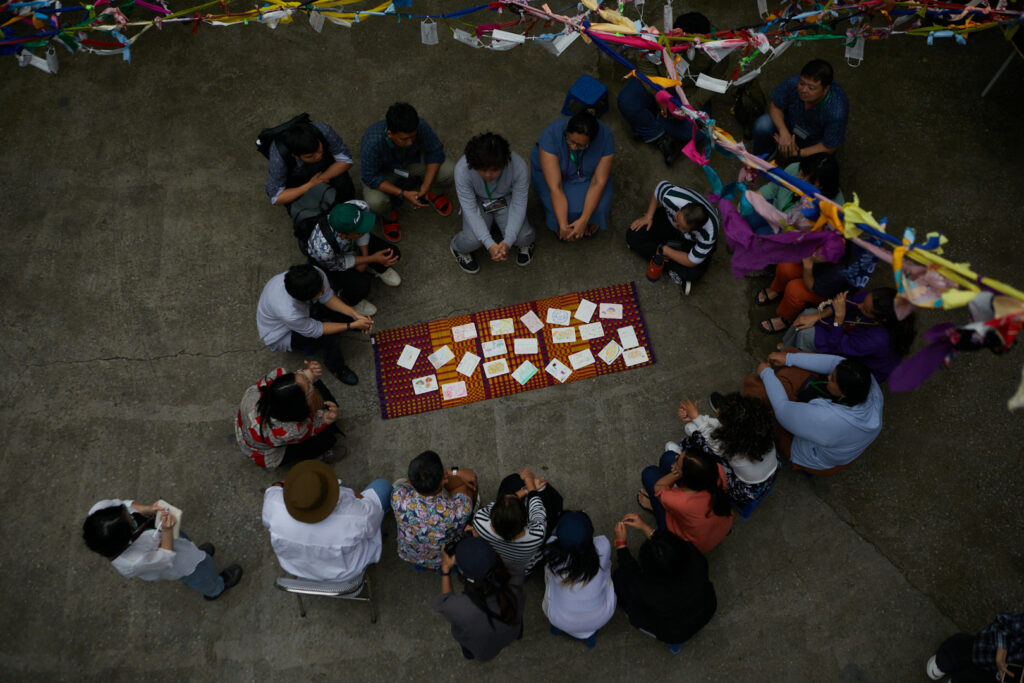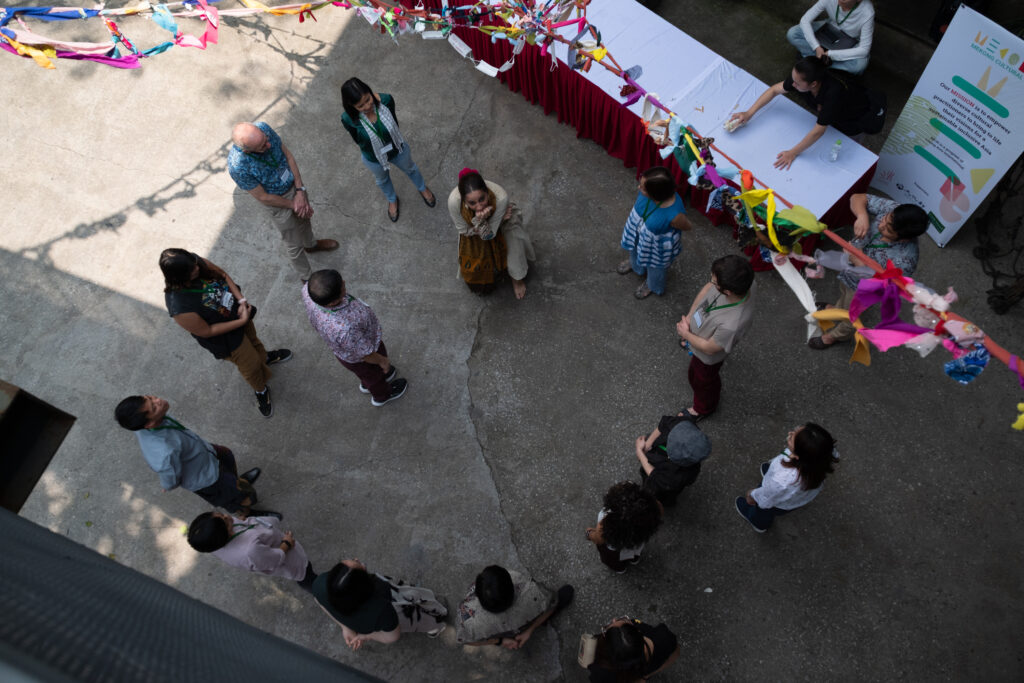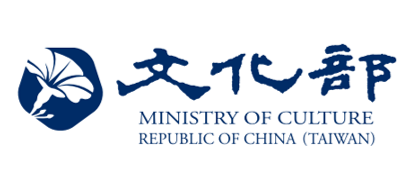2024 Learning Workshop: Ethical Dilemmas in Arts Practice


ABOUT THE PROGRAM
The learning workshop is a series of conversations guided by a practitioner with rich experiences in working on and providing consultancy for dealing with ethical issues in the arts and culture field. Participants come with experiences of dealing with ethical dilemmas in arts practice, open to open-ended conversations, keen to listen and to support each other to gaining better understanding about ethical issues, ways of new thinking, and analyze and seek for better methods to decision-making and references from the learning workshop.
12 people are selected to participate in the 2024 learning workshop, which will be guided online by Deirdre Prins-Solani. Deirdre is an experienced facilitator with expertise in cultural heritage and creative industries with practice focus on capacity building for art sectors, inclusion and wellbeing, invited by MCH to design and guide this program.
There will be one 2-hour orientation and then four 3-hour weekly workshops over 4 weeks online. These will include presentations by the facilitator e.g. what is ethics and ways to integrate ethics into your arts practice; small group discussions on case studies and exchange individual experiences with the group; and, plenary discussion supported and guided by the facilitator. There will be an exercise or reading between each weekly workshop and it will take approximately 60 minutes to complete. The final weekly workshop will include sharing an action plan from participants about how they would like to integrate their learning into their practice after the workshop. During the workshop, the facilitator will support the participants to use collage as a method to visually express and analyse participants’ contexts, experiences, feelings and thoughts as so much of what guides our ethical practice and behaviour are intertwined with these.
Participants who have fully participated in the workshop will have the opportunity to register for a one-to-one follow-up consultation with Deirdre if they would like to gain some advice from Deirdre on a specific dilemma or situation they need to solve.
If you have any questions about the program, you can contact us at jennifer@mekongculturalhub.org
IMPORTANT INFORMATION
● Open call (Deadline: August 28th, 2024)
● Program overview
● Application form
ABOUT THE FACILITATOR
As mentioned above, this guided Learning Workshop will be delivered by an experienced practitioner Deirdre Prins-Solani, she has expertise in cultural heritage and creative industries with practice focusing on capacity building for art sectors, inclusion and wellbeing.
Deirdre Prins-Solani is based in Cape Town, South Africa. She is a closet poet, dabbler in visual arts and avid reader. She has worked in museums, world heritage and professional capacity building in the cultural sector for more than two decades. She is a UNESCO facilitator in intangible cultural heritage (ICH or living heritage). She serves as a committee member of the ICH subcommittee for the Association of Critical Heritage Studies. She has conducted training and policy advisory services across the African continent, the Caribbean and the Asia-Pacific.
Deirdre is invited to lead the learning workshop by MCH and the workshop will be supported by MCH team, including Jennifer LEE, Program Manager and Frances Rudgard, Director. Deirdre has run several workshops with Living Arts International (including MCH) on Embedding Ethical Practices throughout 2022. She also facilitated The MCH “Learning Workshop – Guided conversational learning about ethical dilemmas in arts practice” in 2023.
Participants
Nuur Aqilah Ali
Bandar Seri Begawan
Dac-Hoang Nguyen
Ho Chi Minh City
Tu Hang Nguyen
Hanoi
Haratua Zosran Abednego
Jakarta
Riskya Duavania
Yogyakarta
Kevin Bathman
Kuala Lumpur
Ralph Eya
Nomad
Bảo Thy NGUYEN
Paris
Tams Lu
Singapore
Giah
Iloilo
Foo Wei Meng
George Town
Nora
Yangon
FREQUENTLY ASKED QUESTIONS
Will participants be able to use mobile phones for the digital collaging activity, and how tech-savvy do they need to be?
Answer: Participants do not need to be tech-savvy.We have considered that the app chosen for the digital collaging activity is user-friendly. It should be easy to start to use it and it can be used on both mobile phones and laptops. When the participants work on their collage during the workshop, they will be given time and work on their laptops or mobile phones as well as offline on paper. The method of using collage in the learning workshop is to support the participants’ learning not about the technology. Through the use of collaging, we engage with our contexts differently, perhaps revealing details and nuances we are not aware of. This will help us to think differently, provide fresh insights into the ethical dilemmas we need to address.
Will the workshop involve some principles or also some case study discussions?
Answer: The workshop will involve a mix of methods, these include; introducing guiding principles, small group discussions, plenary discussions, case study discussions and journaling. Participants will also be encouraged to bring and share their own cases into the workshop content for discussion. The Facilitator will share short presentations of examples of principles and tools for developing our intuitive responses to working on ethics in arts practices. This will be drawn from her experiences.
The workshop aims to foster a participatory learning environment where everyone learns from each other. A tool-kit will include all materials prepared by the facilitator, as well as materials which participants wish to share with each other. The toolkit is aimed to serve as a resource and reference for participants beyond the workshop.
Can you provide an example of an ethical dilemma faced and shared by participants from the previous workshop? I am asking this because I want to understand what could be discussed and how the workshop would be like.
Answer: One past participant working on community-based filmmaking faced the dilemma of representing a marginalized community with dignity while dealing with funders who wanted to emphasize the community’s hardships. The participant had to navigate the ethical challenges of storytelling when the stories are not hers, funding, and community involvement to ensure a respectful and impactful representation.
Participant stories are critical for the workshop and so the facilitator will be guided by the dilemmas which are particular to them. The facilitator will also bring in relevant cases to enrich the discussion and support the conversations.
Will the workshop be a space to critically discuss or reveal the ethics in arts practice, for example, a commercial project claims it is a community art? Or will the workshop just explore what is ethics and types of ethics only?
Answer: Yes, the workshop will provide space to critically examine both personal and prevailing ethical practices in the arts. Participants will engage in rigorous self-critique and discussion of broader ethical issues in the field, aiming for transformative and reparative approaches to their work. The workshop will foster an environment where participants feel safe to admit mistakes and critique both their own and others’ practices for understanding deeper and seeking how to do better in their work while considering ethics. Facilitator will guide the discussions to ensure respectful and constructive dialogue, allowing for honest and critical reflections.
Any advice for applicants while preparing their applications?
Answer: There are questions in the application form which we invite you to spend some time and care. The one question asks about any dilemmas you have faced or are facing. Your answer will help the facilitator to prepare the workshop content so as to ensure relevance and navigate the discussions and conversation within the groups.
Another very important question in the application relates to the creation of a safe space for learning and sharing for all. Please do share with us what will make you feel to create a safe space for you and what facilitator/working team should know or pay attention to support you feel safe. It may be related to how you wish to be called and identified – your name, your gender OR it could be being able to identify triggers within the conversations which may need some icebreaker or deep breathing exercises to be done during the session, being granted to have some break, using anonymous names when sharing case studies…There are many more…Please share with us, so as to guide our facilitation.
OTHER TRAINING PROGRAMS
PARTNERS & SUPPORTERS
This program is possible thanks to the support of organisations and individuals including:
